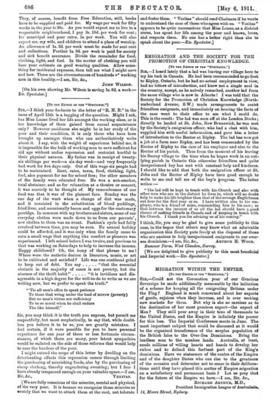[To THE EDITOR or TED "SPECTIT011."3 SIR, I think your
footnote to the letter of "R. N. B." in the issue of April 15th is a begging of the question. Might I ask, has Miss Loane lived her life amongst the working class, or is her knowledge of them gained from casual acquaintance only ? However assiduous she might be in her study of the poor and their condition, it is only those who have been brought up amongst them who can authoritatively write about it. I say, with the weight of experience behind me, it is impossible for the bulk of working men to save sufficient for old age without undue repression and restraint hurtful to their physical natures. My father was in receipt of twenty- six shillings per week—a six-day week—and very frequently had work for five days only. Out of this wage six people had to be maintained. Rent, rates, taxes, food, clothing, light, fuel, also payment for me for school fees; the other members of the family were educated free. He was a non-smoker, total abstainer, and as for relaxation at a theatre or concert, it was scarcely to be thought of. My remembrance of our food was that it was of the plainest fare. Sunday was the one day of the week when a change of diet was made, and it consisted in the substitution of blood puddings, fried liver, and occasionally bacon and eggs for the customary porridge. In common with my brothers and sisters, some of our everyday clothes were made down to us from our parents'; new clothes to them was an event. Fashion's cycle had fully revolved between time, you may be sure. No annual holiday could be afforded, and it was only when the family came to earn a small wage that anything like comfort or pleasure was experienced. I left school before I was twelve, and previous to that was working on Saturdays to help to increase the income. Happy childhood ? Oh, the irony of that phrase to me ! Where were the xsthetic desires in literature, music, or art to he cultivated and satisfied ? Life was one continual grind
to keep out of debt. You say " that the essential obstacle in the majority of cases is not poverty, but the
absence of the thrift habit" "it is invidious and dis- agreeable in a high degree for the well-to-do to write as we are writing now, but we prefer to speak the truth."
"'Ls all men's office to speak patience To those that wring under the load of sorrow (poverty) But no man's virtue nor sufficiency
To be so moral when he shall endure
The like himself."
Sir, you may think it is the truth you express, but permit me respectfully, but most emphatically, to say that, while doubt- less you believe it to be so, you are greatly mistaken. I feel certain, if it were possible for you to have personal experience for one year of these or less fortunate circum- stances, of which there are many, your latent sympathies would be enlisted on the side of those reforms that would help to ease the burdens of the poor.
I might extend the scope of this letter by dwelling on the deteriorating effects this repression causes through limiting the purchasing of nourishing foods, also by the purchasing of cheap clothing, thereby engendering sweating; but I fear I have already trespassed enough on your valuable space.—I am,
[We are fully conscious of the miseries, mental and physical, of the very poor. It is because we recognize those miseries so acutely that we want to attack them at the root, not tolerate and foster them. " Veritas " should read Chalmers if he wants to understand the case of those who agree with us. " Verita.s" appears to be quite unconscious that Miss Loane, as a district nurse, has spent her life among the poor and knows, loves, and respects them. No one has a better right than she to speak about the poor.—En. Spectator.]










































 Previous page
Previous page